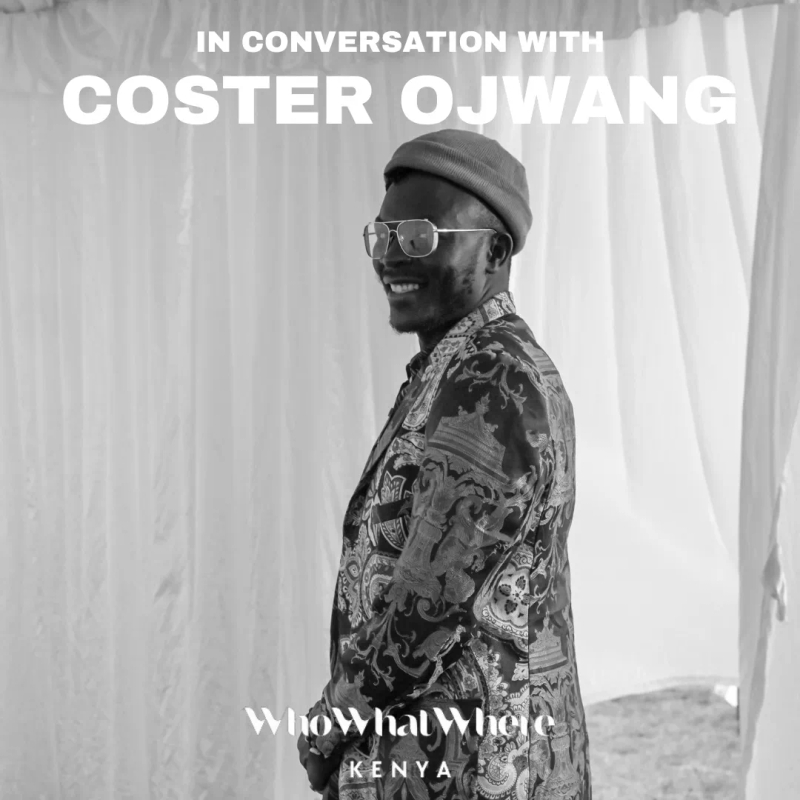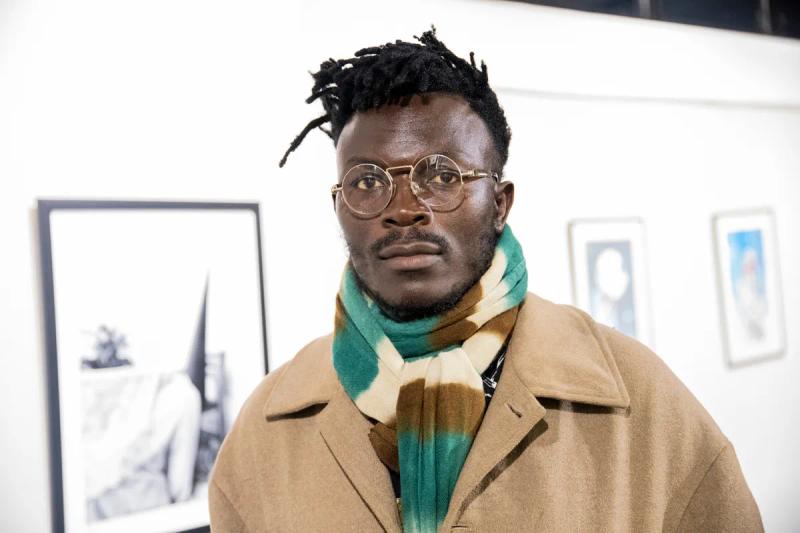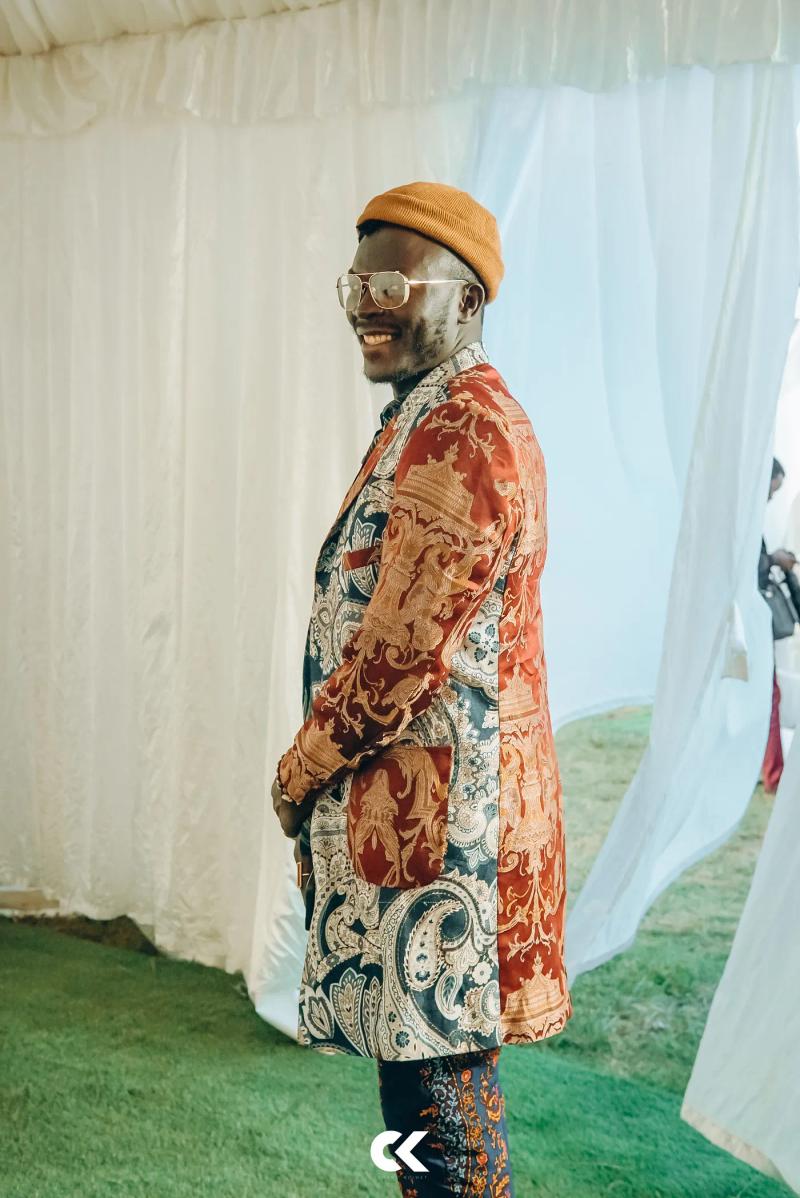in-conversation
In Conversation With Coster Ojwang
by Carl Omolo
January 22, 2024

in-conversation
January 22, 2024

I had the rare opportunity to visit Coster at his home and was stunned to find it covered end to end with marvellous paintings. He gave me the chance to look around and it was just that much of a treat; I was more moved than I had been at any art gallery I had been to in Nairobi. That’s not a dig at the art gallery scene but a testament to the talent I was exposed to. The expectation subversion of entering a home and being accosted by masterpieces wall-to-wall also had something to do with it. It was the quintessential artist’s residence. We sat down over a game of Bingo (not that one) and got to chatting:
First question ni (a bit of a cliché) but what’s your particular approach to songwriting? We ni multi-lingual, multifaceted artist, so where does the process start? In Luo ama in English ama in Kiswahili
It’s random. Whatever comes first, comes first. And then, siandikangi songs per se, I tap into the melodies. So they might come with words, so if they come with words nazichukua venye ziko, halafu nazikeep. Random things really, and so nikiwa kwa studio, mahali pa kucreate, it becomes easier to build from those melodies. So depending on how it comes to me; I can hear a song in Luo or naeza kuwa nikihave a conversation in Luo, I just take it down and save it on my phone. So technically, my phone is my life. Ukichukua simu yangu, I’m completely finished.
Heh, same exact. As a writer, nachukuanga so many notes on my phone; like ideas, plot points ama just something interesting that I would want to execute and work on later. So nikiibiwa simu, ni hivo. It will never be more over.
Nilifanya some research and one of your early posts on Instagram said “Music is love in search of a word,” So how does your painting work fit into your vision of yourself as an artist?
Um, mwanzo, painting didn’t really fit in anywhere. Kwa sababu kuchora nimeifanya for a while. Na muziki sasa ikakuja to be an audio version of expressing some of the things I couldn’t paint about; because music makes noise. So it also reaches to touch people faster than my paintings ever could. However now pia, imefika point where there are some songs that I would like to interpret as paintings.
So both dimensions complement each other well
Eeh, exactly.
That’s cool. My next question actually ties into that: does inspiration for art and inspiration for music come from different avenues ama it’s just one truth you tap into expressed differently?
Hmm. So mwanzo, my early songs were just about me. Ni ile, you’re living your life but outside. Inamake sense?
Inamake sense.
So I was just looking at my life from an outside view and writing songs about my own experiences. From outside to inside. Art was not like that. With art I was documenting spaces around me. Not my own spaces, spaces I’ve been, around me. From inside to outside. And then, when I started being more intentional with music, now that was after some gospel songs, then I started settling sonically. Identifying the space I wanted to be in and finding my sound. So it was then when I started telling other people’s stories; finding inspiration from outside instead of telling my own story all the time.

So I guess that leans more towards the latter.
Eeh, I guess so.
I wouldn’t be a good journalist if I didn’t ask the cliché question, how would you describe your musical journey? Najua from one of your interviews on your page that ulikuwa unafaa kukuwa daktari; so you can tell me about your journey kutoka hapo hadi pahali tumefika saa hii.
I think I’ve seen a fairly good amount of success. Na me huambia wasee I’ve been lucky. Nimekuwa lucku cause nimecheza na musician wakali. Band yangu iko na wasanii wakali, so hio imelift sound yangu majorly. Cause watu wengi wakianza, wanaanza na wanasanii wenzao wenye ndio wanaanza kama yeye. As a vocalist, though I was starting, I already knew how to sing. I wasn’t starting from scratch, I was already singing from back home. So nilitafuta wasee wenye I had known from way back as instrumentalists and walikuwa washamature. Like kama, bassist wangu ni producer wangu and alifanya songs nyingi kali kwa hizo album zangu mbili. Like Oguyo Oguyo, Kionge- songs kali kali. Alifanya Delilah, Nifunze; anyway he used to play for Gilad. Amechezea Adele Onyango pia I think. The same keyboard player played for Mak_Adem. My lead guitarist amecheza na WaCongo na WaJaka wazee Kisumu. My drummer plays for Nina Ogut na amecheza Kisumu pia. Percussionist player wangu aliperform juzi na Muthoni the Drummer Queen. So, they know what they’re doing. They’ve kind of been in the space for a while, but have never been together in a group. So mimi I was the person who was bringing them all together. So hio ililift my sound so much. Ikafanye ikuwe rahisi my sound to compete with bigger, more experienced muscians kwa stage kubwa.
Kukuwa surrounded by all these experienced, talented people inaelevate your sound just naturally from being around them.
Na hata on my songs, they play the instruments. So pia, the songs sound more mature than if they had been played by instrumentalists who were also starting out like me.
If we were to go by Spotify streams, ManyoPesa is one of your most successful songs. From my fasihi simulizi in high school, it classifies as nyimbo ya kazi. Is that something that was considered while making it? It was also a song made in collaboration with Watendawili. Can you tell us a little about how that collaboration was and came to be?
ManyoPesa ni song yenye tulifanya… I was actually in the studio hio siku working on another song, Furahia. Tulikuwa kwa Wuod Omollo and they were there recording another song as well. So mimi nikaingia studio, ndio hao hapo, ndio huyo mimi hapo. Mimi nilkuwa fan wao lakini. Hawakuwa wananijua though. And then, nikawaomba tufanye collab. So, ilikuwa song yenye watu walikuwa wanaongezaongeza vitu. Haikuandikwa na mtu mmoja. Wuod Omollo mwenyewe pia aliongeza vitu. So it was like how tumekaa hapa na wewe and mtu anatoa a thought then tunaona kama inaingia, kama haingii mnatoa. It was a song where everyone added and joined in a little bit with. Halafu tukawachia Wuod Omollo to add the chants kwa background. Trevor, sound engineer mkali aliiskia akavolunteer kuimix for free. “Song ni noma, nipatie niwamixie,” so ikaenda hivo.
So si ati tulikaa chini tukasema tufanye song ya hustle or anything like that, juu hata hio hook yake, ni conversation tu. Just people talking. So it was a song yenye ilicome together tu. Hakukuwa na hio conscious effort to make a work song because it wasn’t written in the traditional way of ‘I do my verse, you send me your verse’ it was just like that.
Oh, okay. Na sasa wewe do you have a particular favourite song on that album or of all time?
Eeh, niko nayo. Watu husema, “Ooh, sina favourites, but yes. Niko nayo.”
Toboa siri
Ni songs mbili: Kionge na Furahia.
No way! Wallahi? You know, Kionge was my favourite song on hio album (Fweny, Revelations). That album ni very sonically rich, venye umesema, kuna so much happening in the background: kuna mtu anaululate, kuna mtu anaongea, there’s birds chirping in the background and everything. So as a maximalist, hizo ndio songs I really love and on the album, nilinotice that it was on the collabs that niliziona zikiwa nyingi. But surprisingly, at the end of the day, my favourite song ilikuwa Kionge because I just have a soft spot for love songs. Huge fan!
That’s it for me as well! Me huboeka sometimes cause, mafans hawazipati venye mimi huzipata.
Kuna hio disconnect sio? Between what you appreciate na what mafans huappreciate
Eeh bana. So you can never really make music for fans, because you don’t know what they’ll love. You have to focus on your own vision halafu if they end up loving them then ni sawa, if not someone else will.
You can’t make art with your audience taking up too much space in your mind. Your artistic voice is most important, hao watapenda yenye watapenda.
Kwanza a good example ni Hera. Tulifanya Hera kwa studio fulani and it was a good song… I didn’t like it. Ilikuwa song poa. Tuliifanya, tukamaliza, tukaweka hadi baseline nikatumia Okello Max. Akasema hapendi hio baseline; nikaiskia akanielezea why hapendi hio baseline. He was right. Tukaenda kwa studio ingine sasa, kwa Wuod Omollo ndio tubuild structure ya baseline mpya completely. Some parts tulibuild, you know lazima you hear the sounds kwanza kwa kichwa ndio itoke. Halafu we released it. Sikuexpect ikuwe song yenye inabeba watu venye inabeba watu. Ikahappen kukuwa song kubwa.
Yaani ikabidi that when I play it live (because lazima nicheze hio song whenever I play ama fans watariot) we have to add things zenye hata mimi zinanifurahisha ndio sasa pia mimi niicheze vizuri. So even when ukiskia tukiicheza live, it’s a bit different from venye iko kwa the produced version. Watu wanaipenda so much so I just had to add some things so that pia mimi niipende!
From your art page, your ‘Missing Links Collection’ is born from the question “What could have been different if a few things went left or right?” Like just how one decision could have your whole life. How does that fit into your life? What events or decisions or opportunities were like that for you?
Um, not being a doctor.
Really?
Yes, and where niko right now, sina regrets. Siwish for any other life, ju itachange experiences zangu. Ningekuwa daktari I would have made some good money but ningekuwa stuck in some hospital somewhere in this country. I wouldn’t have met the people I’ve met, I wouldn’t have interacted with the people I’ve interacted with, the lessons I’ve learnt from life singezilearn. And I’ve had some very beautiful moments as well. And I have very good social currency. Yenye singekuwa nayo ningekuwa daktari. Eeh, so that’s one of them.
Pia, mamangu was pro-education. Sana. So had she been alive, ningesoma. So you see bringing her back then changes so many things. Kuna hadi watu wenye hawafai kuwa wamezaliwa if she is back.
Which five people are in your dream audience? Audience yenye unaeza bambika to play for.
Huh, hm. Sijawahi fikiria hivo. But I’d want my music kuskizwa na Wajaka. Wengi. Saa hii, there’s this idea or notion that we’re playing for posh Luos. Like wenye wameenda shule and everything. Inaingia home pole pole but ningependa Wajaka wengi waziskie. I think I’m telling stories that they would easily understand if they gave it a chance. So hao ni moja. And then… Hii swali ni noma sijawahi fikiria hivo.
Hii crowd niko nayo saa hii inanifurahisha pia.
The current fans bado wanabamba?
I like it cause it’s a good mix. Wanafanya… like they inspire me a lot cause me sikuwa nafikiria watu wenye wanaskiza hizi music wangeziskiza. Kwanza wasapere. Wengi. Na hizi tribe zingine pia. I don’t know what they hear in the music.
Sometimes banger ni banger.
Eeh. Wanazipenda so inafanya nakuwa na drive ya kufanya more. Pia ya kujiuliza maswali, kujipea more writing material.
Like you could never tell. Kama Magoro. Nilikuwa live jana na kuna mtu anapenda hio song. Halafu mi hata nashangaa, “Ni nini unaelewa hapo?”
(laughs)
Haelewi anything. Swali ako nayo tu ni moja: “Magoro inamaanisha nini?” So then now I had to explain that magoro ni mazishi. A funeral. It’s not a happy song really.
So it’s fascinating how the sound catches people differently and then the little, little elements in the sound kuna watu wenye watashika hizo vitu tu. Mtu atashika labda venye kuna triangle kwa hio song so ni hio triangle atashika. Kuna msee anapenda Hera juu ya transition between the song itself to the worship hapo ndani na hizo chants zenye ziko hapo ndani. So, crowd niko nayo saa hii, naipenda tu. Ni the right space for my music to land.
An interesting story about that ni that najua watu wawili wenye wanadate. Mmoja wao ni Mjaka na mwingine si Mjaka. Halafu the girl, mwenye si Mjaka ndio the bigger fan wako so anataka atranslatiwe na the guy. Yaani anataka kulearn the whole language just so anaweza understand the songs more. Ni such a beautiful thing.

If you could experience a day in the life of any musician or painter, for one day, who would it be?
Any musician?
Or painter, yeah.
Mkenya?
Yeyote tu.
Bob Marley!
Mbona?
Um, I think Bob aliexperience both Hollywood na downtown Jamaica. Na I think downtown Jamaica ni more like village yangu.
So, best of both worlds basically?
Eeh. Halafu pahali music yake ilikuwa inakaa kwa society ni mahali music yangu pia inajaribu kukaa. Ikuwe songs about love and then there’s also conscious music.
Excellent! Sasa tukimaliza, what are you up to in Njaanuary? What are your plans for the year?
Narecord tu vitu. Niko na songs zinakam nyingi.
Album mpya ama songs songs tu?
Sijaamua zikuwe nini bado. You know me, I like making songs. Cause naskia songs nyingi sana, kwa kichwa. So I enjoy creating songs halafu around musicians, I’m the most illiterate one. I can’t read shit, I can’t play anything. Well, I can play the guitar but not very well. But if you give me a mic, I think I’m pretty good.
(laughs)
Then, I got into music very late. Most of the people I share stages with, music was the only thing they wanted to do from the beginning. It wasn’t like that for me. Mi nilikuwa nataka kucheza ball, muziki nayo nitafanyia nini.
Kwanza venye tunapendanga ball dala; Me hutoka Siaya, what about you?
Migori. Tunachezanga mpira. So, the fact that I’m doing music now, must mean something, I believe. I started doing music very late, when my priorities were straight. And now I just enjoy making music man. And I’m lucky to enjoy access to good studios and good producers. And then for some weird reason, they see value in the sound that I have. So making music is now easy, cause you have people who believe in whatever sound that is. So, me hurecord sana. Ukiona pia, kuna collaborations nyingi zenye nimefanya. Of course I’d love to sieve through and see which ones make more sense; for sound and for business sometimes. But creation is fun. So I have a lot of songs zinakuja.
So as a final word; what should we look out for and anticipate from you in 2024?
Mhm. I enjoy process. So, I know I’m going to work twice as hard as I worked last year but also be more strategic. I think now fans who come to my shows have an idea of what they can get. I think they have an idea of the lowest we can go, in terms of live experience. They don’t have, how high we can go. So on that they can keep guessing. So, that has value. It has to be attached to some value. So we’ll do more shows.We want to make our sets tighter as well. I want to also, if the money allows, add some other elements, in terms of human beings, kwa the band. Because, nimekuwa na Edu, my guitarist saa hii asubuhi tu and I was thinking, “Wah, wale wanamuziki tunaeza sema ni legendary musicians hapa Kenya, they aren’t too far from us.” In the sense that it wouldn’t take too much effort to access them. There is a lot of space for growth, for anybody who wants to grow and for anybody who is not using here as their standard. The dream has to scare you.
It does. It does. It does.
Kama haikuscare, it’s not worth it. So we want to set standards, not for people but even for ourselves. Let it be scary for ourselves kwanza. As a band. And I’ll land back on the luck part. I’m lucky to have a young band. Watu bado hawajui faces za watu wengine kwa hio band. The amount of experience they can offer as musicians and just how good and how talented they are. So we’d want to also just make that stronger kidogo.
Halafu sasa tukishuka stage, nataka kuenda home. Tukimaliza kuperform tushuke hivi, we’d want to just go home and eat good chicken!
Perfect place to end it.